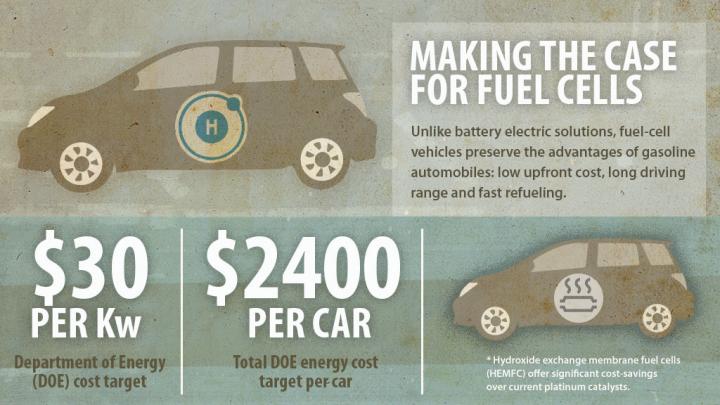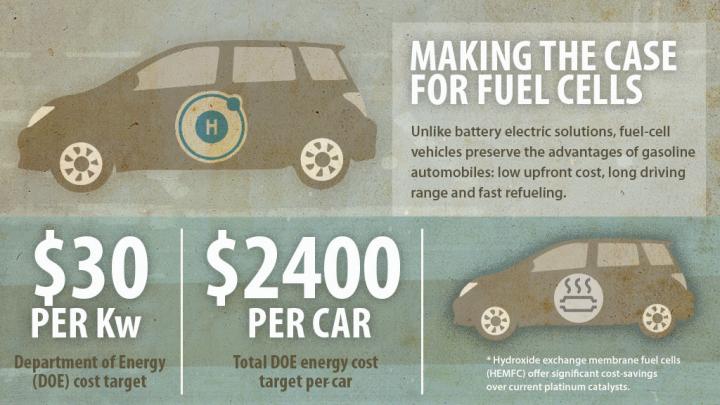
Credit: UNIVERSITY OF DELAWARE/Jeffrey Chase
The pathway to zero-emission vehicles has taken two forks, one toward battery electric cars like the Tesla and the other toward fuel-cell-powered automobiles like the Toyota Mirai.
The University of Delaware's Yushan Yan believes that fuel-cell vehicles are the way to go, because they best preserve the advantages of gasoline automobiles: low upfront cost, long driving range and fast refueling.
But he also believes that a new fuel-cell technology may be necessary.
For Yan, that approach is a new twist on traditional fuel cells, known as proton exchange membrane fuel cells, or PEMFCs, which rely on costly platinum-based catalysts. Yan and his research team are pursuing an alternative technology, the hydroxide exchange membrane fuel cell (HEMFC), because of its inherent cost advantages.
He sees the rationale for this proposed switch as a matter of very simple arithmetic.
"To make fuel-cell cars a reality, the DOE (Department of Energy) has set a system cost target of $30 per kilowatt, which translates into about $2,400 per car," he says. "Right now, the cost for PEMFCs is $52 per kilowatt, which is a big improvement over where the technology started."
"But the catalyst accounts for only about $12 of that total, leaving $40 worth of other components. So even if we throw in some magic, we can't get the rest of the way down to the target of $30 with PEMFCs."
Yan is co-author on a new paper published in the online version of Nature Nanotechnology that he views as a roadmap to a unified strategy for HEMFC zero-emission cars based on three arguments.
"First, to become a commercial reality, fuel-cell engines have to be at cost parity with their gasoline counterparts," he says, "and moving from an acid platform with the PEMFC to a base system with the HEMFC will enable a collateral benefit in bringing down all of the associated costs.
"Then, if we agree that this is the best approach, we need to get everyone in the HEMFC research community on board. If we want to succeed, we have to work together."
Finally, Yan warns that it is insufficient just to have a lower cost.
"It doesn't work to compare our results today with those from yesterday or the day before," he says. "To succeed commercially with HEMFCs, we have to match or beat the performance of PEMFCs. It's that simple — we can't succeed without achieving performance parity."
###
The paper, "Activity Targets for Nanostructured Platinum Group Metal-Free Catalysts in Hydroxide Exchange Membrane Fuel Cells," was co-authored by Brian P. Setzler, Zhongbin Zhuang, Jarrid A. Wittkopf, and Yushan Yan.
Yan is Distinguished Engineering Professor in UD's Department of Chemical and Biomolecular Engineering, Setzler is a postdoctoral researcher in Yan's group, and Wittkopf is a doctoral student advised by Yan.
Zhuang is a professor at Beijing University of Chemical Technology and a former postdoctoral researcher in Yan's group.
Media Contact
Peter Bothum
[email protected]
302-831-1418
@UDResearch
http://www.udel.edu
############
Story Source: Materials provided by Scienmag





